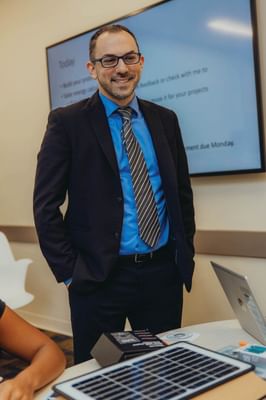- Undergraduate
Bachelor's Degrees
Bachelor of ArtsBachelor of EngineeringDual-Degree ProgramUndergraduate AdmissionsUndergraduate Experience
- Graduate
Graduate Experience
- Research
- Entrepreneurship
- Community
- About
-
Search
All Thayer News

On the Job: Stephen Secules ’07 TH’07
May 07, 2024 | Dartmouth Engineer
Professor
The engineering professor studies ways to diversify engineering as lead of the Equity Research Group and the Justice Equity Diversity Inclusion (JEDI) Ambassadors program at Florida International University.

How does diversifying engineering improves outcomes?
First, it helps undo historical exclusion that originally defined engineering as a field exclusive for white, middle-class men. Second, the populations that engineers design for span all demographic categories, so the engineers we educate should be as diverse as the populations we serve. Third, the way we educate today has consequences for student outcomes in persistence and achievement and repercussions for the engineering field of tomorrow. We are helping create an engineering profession capable of meeting the challenges of the 21st century.
"We are helping create an engineering profession capable of meeting the challenges of the 21st century."
Stephen Secules ’07 TH’07
What techniques are effective in encouraging a broader mindset?
First, try to look at the classroom experience from the student perspective. Then, perhaps drawing on that student perspective, look for items in the classroom that could unintentionally communicate to students that they don’t belong or are failing. Are there classroom competitions that highlight who comes in last place? Does everyone seem to ask questions equally? Once you’ve thought about some of the perspectives and challenges that might be coming up for students, try shifting things. For instance, are there ways to structure open-ended activities so that they are not competitions but instead emphasize collaboration and open-ended exploration?
What make you optimistic?
There have been a lot of strides for women in engineering. I remember feeling proud of Dartmouth for reaching gender parity, although the field at large is somewhere around 25 percent women. Most of the numbers regarding Black students in graduate school and in engineering professions have somewhat stagnated, and they are still significantly underrepresented relative to their national population. However, there is more support for LGBTQ and disabled students in engineering now, which I think has resulted in more visibility and diversification. In some ways, that shift seems to be about broader societal acceptance and our collective ability to talk about these populations. Sometimes I think the conversations we have already constitute progress.
For contacts and other media information visit our Media Resources page.
